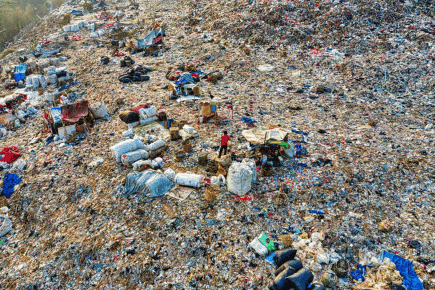Ahead of the final round of UN negotiations for a Global Plastics Treaty industry leaders and leading campaigners have called for a “comprehensive” reassessment of global plastic production.
Led by plastic-free sportswear brand Mover, the group includes mission-driven consultancy firm EA Earth Action, and campaigners, A Plastic Planet and the Centre for International Environmental Law (CIEL).
The industry leaders emphasise that recycling alone is not a sufficient solution to tackle plastic pollution effectively, stating it is a “band-aid solution that will fail to address the tide of plastic waste”.
Instead, the group urges global leaders to initiate a “paradigm shift”, whereby pragmatic solutions to address the root causes of plastic pollution are incorporated into the UN Treaty to phase out unnecessary plastic production. The UN Global Plastics Treaty will represent the world’s first comprehensive effort to regulate plastic, with objectives ranging from curtailing production, to banning specific chemicals and establishing ambitious recycling targets.
Nicolas Rochat, Founder of Mover Plastic-Free Sportswear, said: “We have the technology and resources to create consumer products free from plastic. From innovative fabrics to alternative materials, there are possibilities. What’s missing is the collective commitment to move away from plastic dependency.
“Reducing our use of plastic by 60% in our daily life would be a realistic goal. On a personal level, we can all achieve this from one day to the next, by taking simple steps to reduce our use of plastic and synthetic materials. It is a question of mindset.
“The recycling issue diverts attention from the root problem: the overproduction of plastic. According to the OECD, measures to promote plastic recycling will result in a tripling of global plastic production and therefore of toxic emissions that affect human health and the environment. In areas where alternatives can be developed, we need to embrace them and encourage others to do the same. Because recycling plastics means recycling the problem.”
Julien Boucher, Founder of EA Earth Action said: “Relying on recycling to address the plastic crisis is not enough. The current rate of plastic recycling barely scratches the surface. The complexity of plastic materials and poor infrastructure mean most plastic is never truly recycled. Without reducing overall plastic production, recycling will continue to be a band-aid solution that cannot stem the tide of plastic waste.”Siân Sutherland, Co-Founder of A Plastic Planet, said: “This isn’t just about replacing one material with another. It’s about reimagining our entire consumption model. The plastic crisis is a gateway for us to catalyse innovation, reduce plastic use, redesign products, and think way beyond trying to give this toxic material one more use, one more life, when we know, it is so damaging to nature and to all life.
“But imagine the materials and products we will create next; durable, beautiful, performance materials that are truly circular, the opposite of our current take, make, waste systems. And the good news? So many are available already.”
David Azoulay, Director of CIEL’s Environmental Health Program, said: “Plastics poisons throughout its life cycle. From before the moment the material is even produced, to when it is used and then disposed of, humans and the environment are exposed to thousands of toxic materials linked to serious health issues such as cancer, hormonal imbalances, infertility, and developmental defects.
“We must address these concerns head-on. Relying on recycling and continued plastic use will only prolong these health risks. We first need to reduce our dependence on plastics. And for the plastic that we will still need, we need to fully detoxify the plastic supply chain. Without such a detoxification, the only circularity we are looking at is a circularity of harm and toxic impacts.”
According to data by Earth Action, 28kg of plastic waste per person is generated globally, amounting to 220 million tons per year.Despite improved plastic waste management practices, Earth Action projected a rise of nearly ten percent (7.11%) of global plastic waste generation between 2021 and 2024.In 2024, one-third of plastic waste will be mismanaged at the end of its life, risking 69.5 million tonnes of plastic ending up in oceans and land.
Mover alongside the group stands against positioning recycling as a primary solution in the UN Treaty. Instead, the company advocates for a reduction-first approach that incentivises plastic-free alternatives across industries.





